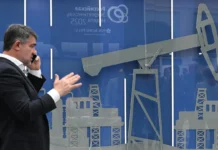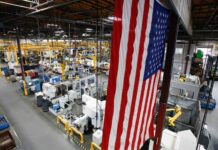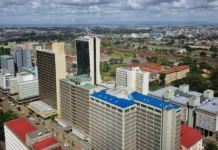Suspicious transactions by one of the companies awarded multibillion-shilling tenders to supply subsidised fertiliser have alarmed financial sector regulators, according to Nation.
Mashambani Farm Inputs Eldoret Ltd was awarded a Sh10.2 billion tender to supply fertiliser to the Kenya National Trading Corporation (KNTC), but regulators have raised concerns about the cash movements and documentation presented to support some of the large transactions.
From large and unexplained cash withdrawals following KNTC payments to allegedly altered documents supporting large money transactions, the firm has piqued the interest of agencies tasked with preventing the movement of illicit funds.
Separately, sources at two financial sector regulators who requested anonymity told Nation that the firm’s bank accounts were being monitored.
However, the sources requested anonymity as they are not permitted to speak to the press without express permission from the institutions’ top brass.
The Financial Reporting Centre, which tracks illicit money, and the Central Bank of Kenya, which regulates the banking sector, are investigating the firm’s recent activities.
The auditing of the accounts is intended to determine whether State officials conspired with the company’s directors to steal billions of dollars from taxpayers through the fertiliser subsidy programme.
President William Ruto initiated the subsidy programme as a long-term solution to fluctuating food prices, which have dealt a financial blow to millions of households in the aftermath of one of the country’s worst drought spells in recent history, as well as global challenges such as the Russia-Ukraine war.
Kenya has imported wheat and agricultural inputs such as fertiliser from the two warring countries over the years. Food prices have risen dramatically as a result of their conflict.
Mashambani Farm Inputs signed a contract with KNTC in January to supply 112,700 metric tonnes of various fertilisers. KNTC is already selling some of the products at subsidised prices to Kenyan farmers.
According to the contract, Mashambani will supply 20,200 tonnes of MiCrop planting (NPK blend), 24,500 tonnes of MiCrop top-dress, and 68,000 tonnes of CAN. All three types of fertiliser must be purchased from Yara, a Norwegian company listed on the Oslo Stock Exchange.
Yara initially won a contract to supply KNTC with 112,700 tonnes of various fertilisers, but it appears to have subcontracted the job to Mashambani.
Documents filed by the KNTC in the National Assembly in preparation for the fiscal year 2023/24 revealed that the State corporation had contracted with Yara to supply it with agricultural input.
Another company, ETG, has a contract with KNTC to supply 130,000 tonnes of various fertilisers. Mashambani, on the other hand, confirmed to Nation that it was subcontracted to supply Yara products to KNTC.
Mashambani received part payment from KNTC only three weeks after the contract was signed. Shortly after, the company wired over Sh320 million to a man named Mr Alfred Rono.
Mashambani claimed the money was for the purchase of packaging bags on the declaration forms for the funds transfer. This is unusual because the fertiliser is already packaged. According to the calculations in the declaration form, Mashambani may spend more than Sh2 billion on packaging bags over the course of its supply agreement, raising questions about why such a large sum would be spent on a redundant item.
When contacted, Mashambani owner George Kibet denied purchasing packaging bags. He also denied that Mashambani is packaging fertiliser, claiming that no local company could package such a large amount of fertiliser.
“There is no single packaging company in Kenya that has the capacity of packaging the number of bags needed to supply farmers in the country with fertilisers. The best that exists can do maybe 20,000 packets in a day, for this case, we needed millions. That would have taken us at least two years to repackage,” he said.
According to the contract, KNTC will pay Sh4,650 for each 50kg bag of MiCrop planting fertiliser purchased by Mashambani. KNTC will also pay Sh4,550 for each bag of CAN and Microp top-dress fertiliser.
When Nation contacted a Mashambani sales representative, the wholesale prices quoted were significantly higher than those negotiated with KNTC. Microp planting costs Sh6,150 for a 50kg bag. Sh5,400 per bag of Microp top-dressing and CAN, according to the representative.
Microp planting costs Sh5,250 per bag from Yara. Microp top dressing costs Sh5,200 per bag, while CAN costs Sh5,150. It is unknown whether Yara and Mashambani will reconcile the actual wholesale price of the fertiliser supplied with the prices offered to KNTC.
There is no public record indicating that KNTC issued a tender that resulted in Yara being chosen as a supplier. While direct procurement is permitted in certain circumstances, government institutions must notify the Public Procurement Regulatory Authority within 14 days if the goods or services exceed Sh500,000.
The team contacted KNTC CEO Pamela Mutua, asking if the government would bridge the price gap and if there was a procurement process in selecting Yara and Mashambani Farm Inputs for the lucrative supply deal.
Ms Mutua had yet to respond to our inquiries at the time of publication.
Read more: Outrage as cheap fertiliser intended for Kakamega farmers ends up in stores
Under the government’s subsidy programme, KNTC sells each bag of fertiliser for Sh3,500. Regulators in the financial sector have also been alerted to suspicious cash withdrawals by Mashambani officials shortly after the KNTC payments.
In one batch of transactions, officials withdrew nearly Sh10 million in cash, claiming in declaration forms that the funds were for salary payments. The move was a departure from the company’s standard policy of paying salaries via bank transfers.
Mashambani executives withdrew Sh2 million in Nairobi without providing adequate explanation on bank declaration forms in another batch of withdrawals. Mashambani Farm Inputs made several payments to various individuals and institutions after receiving funds from the KNTC, with invoices used to support the fund transfers.
The same invoice appears to have been used to support several payments. While the amounts paid varied between documents, the invoice number remained constant. This suggests that the same invoice was altered several times to justify the transfer of funds.
With supporting invoices, the total amount was Sh27 million. However, Mashambani made payments to suppliers totaling more than Sh350 million without providing supporting documentation.
According to the contract between KNTC and Mashambani, the state corporation will purchase fertiliser in 28-tonne batches. Surprisingly, according to the document trail, Mashambani has already delivered 1900 tonnes of fertiliser.
This means that the company has completed at least 67 28-tonne deliveries to KNTC in less than three months, a massive task.



















